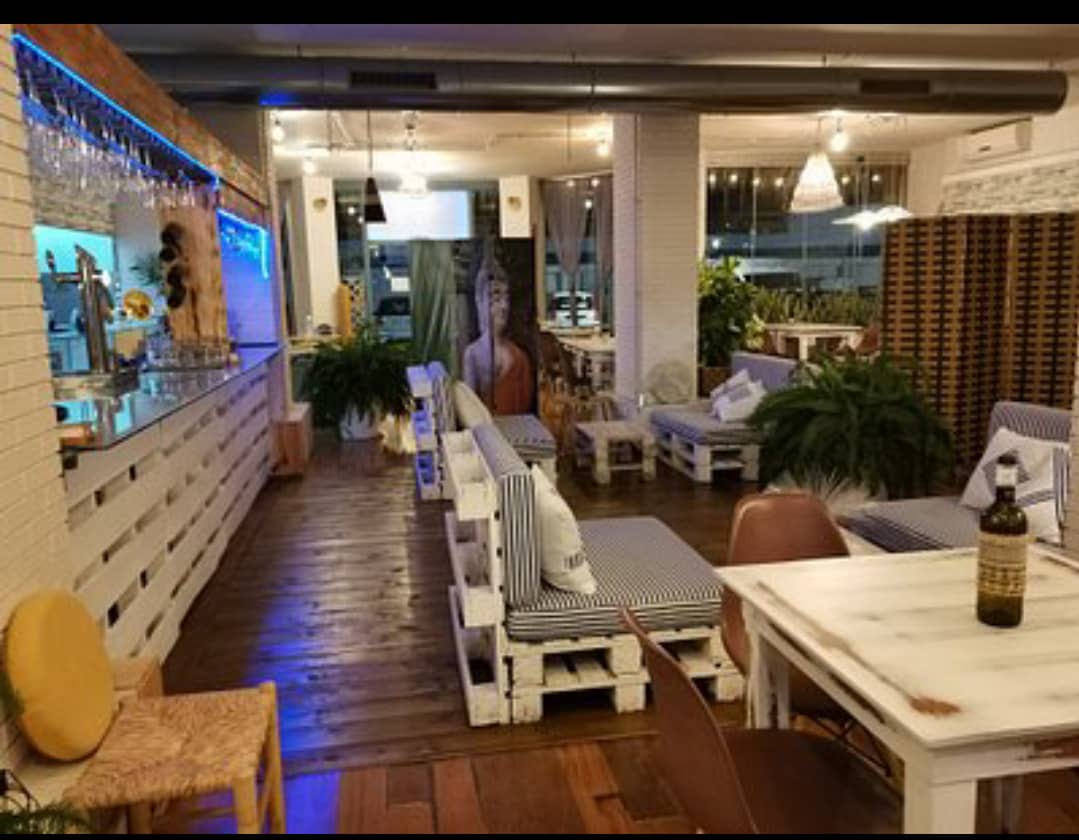society
The Lekki Peninsula: How the Best Restaurants and Bars are Shaping Lagos Real Estate by Dennis Isong

The Lekki Peninsula: How the Best Restaurants and Bars are Shaping Lagos Real Estate by Dennis Isong
Sahara Weekly Reports That The Lekki peninsula stands out as a beacon of modernity and luxury. Over the past decade, Lekki has transformed from a quiet, residential area into a sought-after destination for both locals and expatriates. This transformation has been driven, in large part, by the emergence of world-class restaurants and bars that have put Lekki on the map as a culinary hotspot.
In this article, we’ll explore the best restaurants and bars that Lekki has to offer, telling you the unique flavors and experiences that make each establishment stand out. We’ll also examine how this burgeoning food and beverage scene has had a profound impact on the real estate market in Lagos, particularly in the Lekki area. From increased property values to the development of mixed-use spaces, the relationship between Lekki’s culinary offerings and its real estate market is a fascinating example of how lifestyle amenities can shape urban development.
The Culinary Renaissance of Lekki
Fine Dining Establishments
Lekki’s transformation into a gastronomic paradise began with the arrival of several high-end restaurants that brought international cuisines and fine dining experiences to the area. One of the pioneers in this space is “Nok by Alara,” a restaurant that has redefined contemporary African cuisine. Located in the iconic Alara concept store, Nok offers a menu that showcases the diverse flavors of the continent, presented with modern flair and impeccable service.
Another standout in the fine dining category is “Oreka,” a restaurant that combines Mediterranean and Nigerian influences to create a unique fusion cuisine. With its elegant decor, panoramic views of the Lagos lagoon, and innovative menu, Oreka has quickly become a favorite among Lekki’s discerning diners.
For those seeking an authentic Italian experience, “Bungalow Restaurant” offers a taste of the Mediterranean right in the heart of Lekki. Known for its handmade pasta, wood-fired pizzas, and extensive wine list, Bungalow has become a go-to spot for romantic dinners and business lunches alike.
Trendy Casual Eateries
While fine dining establishments have certainly put Lekki on the culinary map, it’s the trendy casual eateries that have truly captured the hearts of locals and visitors. “The Harvest” is a prime example of this trend, offering farm-to-table cuisine in a relaxed, Instagram-worthy setting. With its focus on locally sourced ingredients and innovative takes on Nigerian classics, The Harvest has become a hotspot for young professionals and food enthusiasts.
“Craft Gourmet by Lou Baker” is another casual dining success story in Lekki. This artisanal bakery and cafe has gained a loyal following for its freshly baked breads, gourmet sandwiches, and decadent desserts. The laid-back atmosphere and all-day dining options make it a popular choice for both quick bites and leisurely brunches.
For those craving international flavors, “Cilantro” brings a taste of West Asia and North Africa to Lekki. With its vibrant decor and menu featuring everything from Lebanese mezze to Moroccan tagines, Cilantro has become a go-to spot for groups looking to share a diverse array of dishes in a lively atmosphere.
Innovative Bars and Lounges
No discussion of Lekki’s culinary scene would be complete without mentioning the innovative bars and lounges that have sprung up in recent years. “Brass and Copper” leads the pack with its speakeasy-inspired decor and expertly crafted cocktails. The bar’s mixologists are known for their creative concoctions that often incorporate local ingredients and spirits, offering a uniquely Nigerian twist on classic cocktails.
For those seeking a more laid-back vibe, “Crossroads” has become a favorite among Lekki residents. This rooftop bar offers stunning views of the Lagos skyline, coupled with an extensive list of local and international beers, wines, and spirits. The bar’s regular live music nights have made it a cultural hub for the area’s creative community.
“The Blowfish” rounds out Lekki’s top-tier bar scene with its sophisticated ambiance and focus on premium spirits. Known for its extensive whiskey collection and cigar lounge, The Blowfish caters to a more mature crowd looking for a refined nightlife experience.
The Impact on Lagos Real Estate
Rising Property Values
The influx of high-quality restaurants and bars in Lekki has had a significant impact on the area’s real estate market. As these establishments have attracted more visitors and residents to the area, demand for both residential and commercial properties has skyrocketed. This increased demand has led to a substantial rise in property values across Lekki.
Real estate experts estimate that properties in close proximity to popular dining and entertainment spots have seen value increases of up to 30% over the past five years. This trend is particularly evident in areas like Lekki Phase 1 and Admiralty Way, where many of the top restaurants and bars are concentrated.
The rising property values have not only benefited existing property owners but have also attracted significant investment from both local and international real estate developers. These developers are eager to capitalize on Lekki’s growing reputation as a lifestyle destination, leading to the construction of new luxury apartments, condominiums, and mixed-use developments.
Development of Mixed-Use Spaces
One of the most notable trends in Lekki’s real estate market has been the rise of mixed-use developments that combine residential, commercial, and entertainment spaces. These developments are designed to cater to the growing demand for integrated living experiences, where residents can work, dine, and socialize all within the same complex.
A prime example of this trend is the “Lekki Pearl Estate,” a sprawling development that includes luxury apartments, office spaces, a shopping mall, and a dedicated restaurant and bar district. By incorporating high-end dining options and trendy bars into the development plan, the developers have created a self-contained community that appeals to young professionals and families alike.
Similarly, the “Landmark Village” development has capitalized on Lekki’s culinary scene by creating a waterfront promenade lined with restaurants and bars. This approach has not only increased the appeal of the residential and office spaces within the development but has also created a new destination for dining and entertainment in Lekki.
Attraction of International Investors
The thriving food and beverage scene in Lekki has not gone unnoticed by international investors. As the area’s reputation has grown, it has attracted attention from global hotel chains, restaurant groups, and real estate investment trusts (REITs) looking to enter the Nigerian market.
Several international hotel brands have announced plans to open properties in Lekki, drawn by the area’s growing reputation as a lifestyle destination. These hotels often feature multiple dining options and bars, further enhancing Lekki’s culinary landscape while also driving up property values in the surrounding areas.
Additionally, international restaurant chains and celebrity chefs have begun to express interest in opening outposts in Lekki. This influx of global brands is expected to further cement Lekki’s status as a culinary destination and continue to drive real estate development in the area.
Infrastructure Improvements
The success of Lekki’s restaurants and bars has also led to significant infrastructure improvements in the area. As more visitors flock to Lekki for its dining and entertainment options, there has been increased pressure on local authorities to improve roads, public transportation, and other essential services.
These infrastructure improvements have, in turn, made Lekki an even more attractive location for real estate development. Better roads and transportation options have expanded the area’s catchment, allowing developers to build in previously less accessible locations while still benefiting from proximity to the established dining and entertainment hubs.
Creation of New Job Opportunities
The growth of the restaurant and bar scene in Lekki has also led to the creation of numerous job opportunities, both directly in the hospitality industry and indirectly in related sectors. This increase in employment has further driven demand for housing in the area, as workers seek to live closer to their places of work.
Real estate developers have responded to this trend by creating more affordable housing options alongside luxury developments. This diversification of the housing stock has helped to create a more balanced and sustainable real estate market in Lekki, catering to a wide range of income levels and lifestyles.
Challenges and Future Outlook
While the impact of Lekki’s culinary scene on the real estate market has been largely positive, it has not been without its challenges. The rapid development and gentrification of the area have led to concerns about affordability and the displacement of long-time residents. Local authorities and developers are now grappling with how to balance the area’s growth with the need to maintain its character and inclusivity.
There are also concerns about market saturation, as the number of restaurants and bars in Lekki continues to grow. Some industry experts worry that the market may not be able to sustain the current rate of growth, which could lead to closures and potentially impact property values.
Despite these challenges, the outlook for Lekki’s culinary scene and its impact on the real estate market remains largely positive. As Lagos continues to grow and attract both domestic and international investment, Lekki is well-positioned to remain at the forefront of the city’s developmentt.
As Lekki continues to evolve, it will be fascinating to see how this relationship develops further. Will the area be able to maintain its balance of high-end establishments and local favorites? How will developers and city planners address the challenges of rapid growth and gentrification? And what new culinary trends and real estate innovations will emerge in the coming years?
One thing is certain: Lekki’s transformation from a quiet suburban area to a vibrant, cosmopolitan destination has been driven in large part by its thriving food and beverage scene. As long as the area continues to innovate and adapt, it is likely to re
main at the heart of Lagos’s culinary and real estate landscape for years to come.
society
Ramadan: Adron Homes Felicitates Muslims, Preaches Hope and Unity

Ramadan: Adron Homes Felicitates Muslims, Preaches Hope and Unity
Adron Homes & Properties Limited has congratulated Muslim faithful on the commencement of the holy month of Ramadan, urging Nigerians to embrace the virtues of sacrifice, discipline, and compassion that define the season.
In a statement made available to journalists, the company described Ramadan as a period of deep reflection, spiritual renewal, and strengthened devotion to faith and humanity.
According to the management, the holy month represents values that align with the organisation’s commitment to integrity, resilience, and community development.
“Ramadan is a time that teaches patience, generosity, and selflessness. As our Muslim customers and partners begin the fast, we pray that their sacrifices are accepted and that the season brings peace, joy, and renewed hope to their homes and the nation at large,” the statement read.
The firm reaffirmed its dedication to providing affordable and accessible housing solutions to Nigerians, noting that building homes goes beyond structures to creating environments where families can thrive.
Adron Homes further urged citizens to use the period to pray for national unity, economic stability, and sustainable growth.
It wished all Muslim faithful a spiritually fulfilling Ramadan.
Ramadan Mubarak.
society
Underfunding National Security: Envelope Budgeting Fails Nigeria’s Defence By George Omagbemi Sylvester

Underfunding National Security: Envelope Budgeting Fails Nigeria’s Defence
By George Omagbemi Sylvester | Published by saharaweeklyng.com
“Fiscal Rigidity in a Time of Crisis: Lawmakers Say Fixed Budget Ceilings Are Crippling Nigeria’s Fight Against Insurgency, Banditry, and Organized Crime.”
Nigeria’s legislature has issued a stark warning: the envelope budgeting system; a fiscal model that caps spending for ministries, departments, and agencies (MDAs) is inadequate to meet the country’s escalating security challenges. Lawmakers and budget analysts argue that rigid fiscal ceilings are undermining the nation’s ability to confront insurgency, banditry, kidnapping, separatist violence, oil theft and maritime insecurity.
The warning emerged during the 2026 budget defence session for the Office of the National Security Adviser (ONSA) at the National Assembly in Abuja. Senator Yahaya Abdullahi (APC‑Kebbi North), chairman of the Senate Committee on National Security and Intelligence, decried the envelope system, noting that security agencies “have been subject to the vagaries of the envelope system rather than to genuine needs and requirements.” The committee highlighted non-release or partial release of capital funds from previous budgets, which has hindered procurement, intelligence and operational capacity.
Nigeria faces a multi‑front security crisis: persistent insurgency in the North‑East, banditry and kidnappings across the North‑West and North‑Central, separatist tensions in the South‑East, and piracy affecting Niger Delta oil production. Despite declarations of a national security emergency by President Bola Tinubu, lawmakers point to a “disconnect” between rhetoric and the actual fiscal support for agencies tasked with enforcement.
Experts warn that security operations demand flexibility and rapid resource allocation. Dr. Amina Bello, a public finance specialist, said: “A static budget in a dynamic threat environment is like sending firefighters with water jugs to a forest fire. You need flexibility, not fixed ceilings, to adapt to unforeseen developments.”
The Permanent Secretary of Special Services at ONSA, Mohammed Sanusi, detailed operational consequences: irregular overhead releases, unfulfilled capital appropriations, and constrained foreign service funds. These fiscal constraints have weakened intelligence and covert units, hampering surveillance, cyber‑security, counter‑terrorism and intelligence sharing.
Delayed capital releases have stalled critical projects, including infrastructure upgrades and surveillance systems. Professor Kolawole Adeyemi, a governance expert, emphasized that “budgeting for security must allow for rapid reallocation in response to threats that move faster than political cycles. Envelope budgeting lacks this essential flexibility.”
While the National Assembly advocates fiscal discipline, lawmakers stress that security funding requires strategic responsiveness. Speaker Abbas Ibrahim underscored that security deserves “prominent and sustained attention” in the 2026 budget, balancing oversight with operational needs.
In response, the Senate committee plans to pursue reforms, including collaboration with the executive to restructure funding, explore supplementary budgets and ensure predictable and sufficient resources for security agencies. Experts warn that without reform, criminal networks will exploit these gaps, eroding public trust.
As one policy analyst summarized: “A nation declares a security emergency; but if its budget does not follow with real resources and oversight, the emergency remains rhetorical.” Nigeria’s debate over envelope budgeting is more than an accounting dispute; it is a contest over the nation’s security priorities and its commitment to safeguarding citizens.
society
Rev. Mother Kehinde Osoba (Eritosin) Celebrates as She Marks Her Birthday

Rev. Mother Kehinde Osoba (Eritosin) Celebrates as She Marks Her Birthday
Today, the world and the body of Christ rise in celebration of a rare vessel of honour, Rev. Mother Kehinde Osoba, fondly known as Eritosin, as she marks her birthday.
Born a special child with a divine mark of grace, Rev. Mother Eritosin’s journey in God’s vineyard spans several decades of steadfast service, spiritual depth, and undeniable impact. Those who know her closely describe her as a prophetess with a heart of gold — a woman whose calling is not worn as a title, but lived daily through compassion, discipline, humility, and unwavering faith.
From her early days in ministry, she has touched lives across communities, offering spiritual guidance, prophetic insight, and motherly counsel. Many testify that through her prayers and teachings, they encountered God in a deeply personal and transformative way. Near and far, her influence continues to echo — not only within church walls, but in homes, families, and destinies reshaped through her mentorship.
A mother in every sense of the word, Rev. Mother Kehinde Osoba embodies nurture and correction in equal measure. As a grandmother, she remains energetic in purpose — accommodating the wayward, embracing the rejected, and holding firmly to the belief that no soul is beyond redemption. Her life’s mission has remained consistent: to lead many to Christ and guide them into the light of a new beginning.
Deeply rooted within the C&S Unification, she stands tall as a spiritual pillar in the Cherubim and Seraphim Church globally. Her dedication to holiness, unity, and prophetic service has earned her widespread respect as a spiritual matriarch whose voice carries both authority and humility.
As she celebrates another year today, tributes continue to pour in from spiritual sons and daughters, church leaders, and admirers who see in her a living reflection of grace in action.
Prayer for Rev. Mother Kehinde Osoba (Eritosin)
May the Almighty God, who called you from birth and anointed you for His service, continually strengthen you with divine health and renewed vigour.
May your oil never run dry, and may your prophetic mantle grow heavier with greater glory.
May the lives you have nurtured rise to call you blessed.
May your latter years be greater than the former, filled with peace, honour, and the visible rewards of your labour in God’s vineyard.
May heaven continually back your prayers, and may your light shine brighter across nations.
Happy Birthday to a true Mother in Israel — Rev. Mother Kehinde Osoba (Eritosin).
More years.
More anointing.
More impact.
If you want this adapted for a newspaper page, church bulletin, Facebook post, or birthday flyer, just tell me the format and tone.
-

 celebrity radar - gossips6 months ago
celebrity radar - gossips6 months agoWhy Babangida’s Hilltop Home Became Nigeria’s Political “Mecca”
-

 society6 months ago
society6 months agoPower is a Loan, Not a Possession: The Sacred Duty of Planting People
-

 society5 months ago
society5 months agoReligion: Africa’s Oldest Weapon of Enslavement and the Forgotten Truth
-

 news6 months ago
news6 months agoTHE APPOINTMENT OF WASIU AYINDE BY THE FEDERAL GOVERNMENT AS AN AMBASSADOR SOUNDS EMBARRASSING











